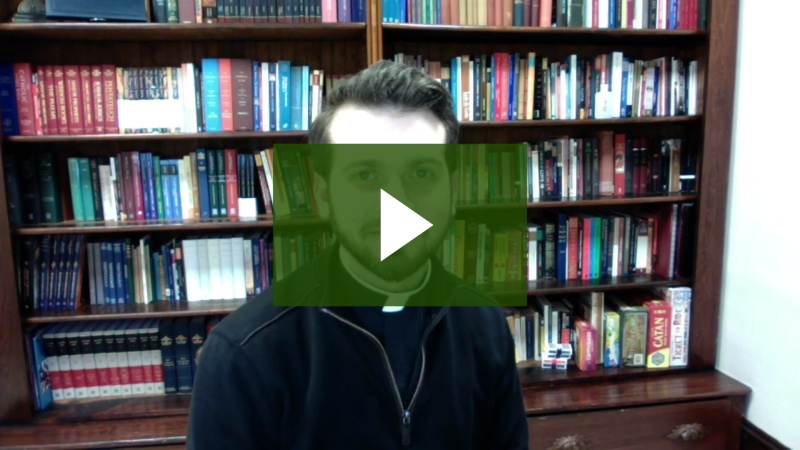Preparing for Antiphons (Part 1 of 3)
As we look ahead to Advent, we will be adjusting our singing of the Mass. Starting on the First Sunday of Advent (November 28th), we will begin to sing the Entrance and Communion Antiphons at Mass. Please don’t be alarmed! If we all put our hearts into it, it will be a really good thing for us. One of the things I love about being here in the St. Henry family of parishes is how the congregations all give themselves over wholeheartedly to singing at Mass. This is why I think we can make these adjustments well.
Does this mean no more hymns? Of course not. We are simply making room for what the Church upholds as the ideal form of music at Mass, in conjunction with hymns at other appointed moments in the Mass. Antiphons are truly the Church’s preferred music for the Sacred Liturgy.
But what is an antiphon? Antiphons are passages (usually from Scripture) meant to be sung before and after verses from the Psalms or canticles of Holy Scripture. That likely sounds familiar because this is essentially how the Responsorial Psalm functions. The Roman Missal (the big book the priest uses at Mass) includes an Entrance Antiphon at the beginning of Mass and the Communion Antiphon. For those who may attend daily Mass, you will often hear the priest recite these at the proper times.
That’s all well and good, but you may still be wondering: Why do we need to sing them? Why can’t we just sing what we’ve been singing? These are good questions. Vatican II clearly stated that the chanted antiphons have pride of place in the Mass. Furthermore, it is a question of what the Church means by sacred music. When something is “sacred”, it means that it has been “set apart” for God. In a very real sense, each of us is “sacred” by virtue of our Baptism, when we were literally set apart for God as His special possession; we become less sacred the more we conform our lives to the world rather than to God. Likewise, when we call something sacred, we are essentially saying that this “thing” is set apart for God in such a way that it is kept in reserve for His purposes and in order to give Him glory – it is characteristically “His”. When we refer to sacred music, we mean the kind of music that has been especially set apart for God, for His purposes and to give Him glory, and it is considered sacred the more closely it conforms to holy things rather than to secular things. The Holy Mass, and with it the Holy Eucharist, are literally the holiest things on earth!
Music is then considered sacred to the extent that it more perfectly conforms to these realities. As the Second Vatican Council stated: “Sacred music is to be considered the more holy in proportion as it is more closely connected with the liturgical action…” (Sacrosanctum Concilium, n. 112). The antiphons fulfill this purpose because they are directly connected to specific liturgical actions, and thus aid all of us in entering more actively (and actually!) into the Mass. They are considered sacred because they come from the Mass and help us to enter more deeply into the Mass. Each liturgical day is accompanied by antiphons that are proper to this celebration of the Mass on this specific day during this specific liturgical action. For example, the Entrance Antiphon is meant to foster a spirit of preparation and “ascent of the heart and soul” as the faithful prepare to approach God’s holy altar; the Communion Antiphon is meant to foster a spirit of humility, adoration, and devotion as the faithful prepare to receive the Most Holy Body and Blood of Jesus. Because of their repetitive nature (repeating the antiphon after each verse of Scripture), the antiphons have a unique power to foster certain attitudes and dispositions that are especially suited to worshipping the Lord at Holy Mass and that are meant to be carried from the Mass into the worship we offer in our daily lives – as the Latin proverb states: repetitio est mater studiorum (“repetition is the mother of all learning”). Ideally, as we repeat the antiphon in a spirit of devoted prayer, the religious disposition the antiphon engenders will “settle into” our hearts and souls, so long as we are open to it.
This is much to pack into one blog, but more information and explanation will be forthcoming, both here and through some videos (with a tutorial!) we will release in the coming weeks. At first, this all may seem “strange” – but the Mass is truly unlike anything else in the world – shouldn’t our music reflect its sacred and unique nature? If we approach these adjustments with an open heart and in a spirit of humility (and with the strength of voice that is so wonderfully typical of our communities), it will become something very beautiful. I recognize this is going to take some effort and it won’t necessarily be an easy adjustment, but I have faith in our ability to rise to the task in order to give greater glory to God while we worship Him in the Sacred Liturgy. May God bless you in the week ahead and may Mother Mary lead you more deeply into the Sacred and Merciful Heart of Jesus.
Fr. Hess




